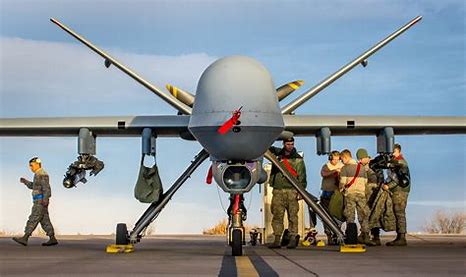DRONE WARS: WHOSE LAWS WILL APPLY?
“Biden had quietly put in place [with a new drone strike policy in early October 2022] many of the limitations that the new policy now formalizes when he took office. The policy now officially reverses a loosening of Obama-era rules under then-President Trump, which had pushed authority for approving lethal [drone] strikes down the chain of command.”
Katie Bo Lillis[1]
“If [I’m] in the field risking and taking a life, there’s a sense that I’m putting skin in the game … I’m taking a risk so it feels more honorable. Someone who kills at a distance—it can make them doubt. Am I truly honorable?”
Shannon E. French[2]
In case you haven’t noticed, the increasing automation and efficiency of killing machines has prompted a tension in military decision-making: how do we preserve traditional American values of limiting quasi-battlefield civilian casualties in a techno-world that is becoming increasingly hostile to everything we stand for?
Along these lines, the Biden administration a few days ago formalized a new drone strike policy that had been put in place much earlier.[3] Military and CIA officials must now obtain White House permission for drone strikes outside conventional battlefield zones. The new policy was reportedly in effect in late September (2022)—some eleven months after American forces were pulled from Afghanistan—when Biden announced the drone killing of al-Qaida leader Ayman al-Zawahiri in Kabul, where he was hiding with his family.[4]
Biden’s new policy, and the decisional problems it represents, is a unique aspect of American security policy. Can you imagine, for example, Russia’s President Putin being guided by a set of policies limiting Ukrainian civilian casualties in using drones in his “special operation” in the Ukraine (now approaching nine months old)? Or, now that China’s Xi Jinping has secured an unprecedented third term in office—in the process accumulating more power in his hands than any leader since Chairman Mao—hamstringing his military’s drone strikes in a future invasion of Taiwan to prevent civilian casualties?
Democratic societies and authoritarian societies have widely differing views when it comes to the laws of war.
And the value of life.
Technology is narrowing the differences.
On one notable occasion, for example, officials in the Obama administration faced an uncomfortable decision point that pitted the unique American way of waging war in the face of an intractable foe, all unfolding amid the backdrop of increasingly capable and sophisticated AI-enhanced overhead systems. Even as a very low-ranking intelligence officer, on the far margins of the policy discussions in those years, I can still recall the tension involved. Much later, I spent several classes discussing this same decisional nexus when I was teaching a Terrorism course for the Criminal Justice Department at the College of the Ozarks.
The decision then was even more difficult because it involved an American citizen. The specific case involved a Yemeni-American Muslim imam named Anwar al-Awlaki who was killed in September 2011, in Yemen, by a U.S. government (CIA) drone strike ordered by then-President Barack Obama. Al-Awlaki, dubbed by an Arabic satellite network as the “bin Laden of the Internet,”[5] was the first U.S. citizen to be deliberately targeted and killed by a government-authorized drone strike.[6]
Now as then, it is not easy for an American President to order the killing of a U.S.-born citizen, by a drone or otherwise.
And that is a good thing.
The al-Awlaki situation was unique. Al-Awlaki was born in Las Cruces, New Mexico where his father earned a master’s degree in agricultural economics at New Mexico State University. Al-Awlaki returned with his family to Yemen in 1978 (at age seven). Subsequently, he returned to the U.S. in 1991, studying first at Colorado State University (Fort Collins) and then spent over a decade rotating from Denver, and San Diego, to Northern Virginia (where he was chief cleric at the Dar Al-Hirah Islamic Center mosque in Falls Church, Virginia). In 2002, he went to London, where he preached in several mosques known for radical ideologies. Al-Awlaki returned to Yemen in 2004 and was imprisoned on kidnapping charges (released in 2007). By April 2010, al-Awlaki’s name appeared on a list of specially designated global terrorists because, in the words of then-CIA Director Leon Panetta, he was a “terrorist who declared war on the United States.” According to 9/11 Commission Report, al-Awlaki became a priority for the FBI after his connections were revealed with Nidal Hassin (a Muslim U.S. Army officer who killed 13 people in November 2010 at Fort Hood, Texas), a Nigerian Umar Farouk Abdulmutallab (the so-called “underwear bomber” for his attempt to blow up a commercial aircraft on Christmas Day 2009), his preaching to several 9/11 hijackers, and providing on-line inspiration for a generation of would-be terrorists, many of whom attempted terrorist attacks.[7]
Indeed, it was al-Awlaki—not Osama bin Laden—who was labeled as “the most dangerous man in the world” by New York Police Department counterterror officials in late 2010. Why? His American upbringing, and religious fervor, combined with his technological savvy and writing skills, combined to make al-Awlaki the most capable recruiter of his generation for radicalized Muslim extremists. In a video presentation in November 2010, for example, he told his worldwide audience that no one needs special permission to kill Americans because they were are all “devils” and the “enemy.”[8]
But that was so long ago.
Today, the FBI has more dangerous targets to surveil and monitor: parents protesting school board decisions, administration critics with opposing ideological views, and more recently, of course, Christian Nationalists (whatever and whoever they are).
At any rate, American military and intelligence officials in the 2010-2011 timeframe were hesitant to target al-Awlaki without the covering of a presidential finding. Eight years earlier, there had been considerable public controversy when it was revealed that an American citizen, Ahmed Hijazi—a citizen of New York—was killed in a CIA Predator drone strike targeting al Qaeda leaders.[9]
All this set the stage, in my view, for one of the more interesting legal cases in American history. Al-Awlaki’s father, a former Yemeni diplomat who had returned to the U.S., upon learning that his son was on a list to be targeted by the U.S., brought a lawsuit to prevent such an action. The father claimed that al-Awlaki’s listing violated his son’s due process rights under the U.S. Constitution. Eventually, the case was determined by a federal judge in Washington D.C. (U.S. District Judge John Bates), who ruled that the case could not go forward because the father lacked standing and his claims were nonjusticiable under the political question doctrine.[10] At the same time, Judge Bates recognized the “unsettling nature” of the court’s conclusion. Indeed, the opinion noted some “stark and puzzling questions: How is it that judicial approval is required when the U.S. decides to target a U.S. citizen abroad for electronic surveillance, but that, according to defendants, judicial scrutiny is prohibited when the U.S. decides to target a U.S. citizen overseas for death?”[11]
A good question indeed. But—I suggest respectfully—only a question that could be asked by a court in our American system (or a country with comparable Western values). I cannot imagine such a case even being considered in countries like China, Russia, North Korea or Iran.
Can you?
To compound the ethics issue, another drone strike, a month later, killed al-Awlaki’s 16-year-old son in a remote part of Yemen, along with eight others, prompting a public outcry.[12]
From a technological and performance perspective, drones have come a long way since the CIA Predator drone that killed al-Awlaki. They are far more capable and lethal in every respect.
Military drone-related black programs are years ahead of their commercial counterparts. For now, this commercial world belongs to the Chinese. In the high-tech hub of Shenzhen alone (several scenes of my futuristic trilogy are set in Shenzhen), the largest commercial drone manufacturer in the world, DJI Technology Co.,[13] produces eight out of every ten non-military drones purchased around the world and is one of 600 drone manufacturers in the city.[14] The commercial drone industry by itself is expected to reach US$42.8 billion in 2025.
Drones anyone?
Or should we let the algorithms decide?
[1] Katie Bo Lillis, “Biden finalizes new rules for US drone strikes,” CNN, Oct. 7, 2022.
[2] Professor French is the director of the Center for Ethics and Excellence at Case Western Reserve University, a former professor at the U.S. Naval Academy, and author of The Code of the Warrior.
[3] Charlie Savage and Eric Schmitt, “Biden Secretly Limits Counterterrorism Drone Strikes Away From War Zones,” The New York Times, Mar. 3, 2021.
[4] Matthew Lee, et.al., “CIA drone strike kills al-Qaida leader in Afghanistan,” PBS, Aug. 1, 2022.
[5] Aamar Madhani, “Cleric al-Awlaki dubbed ‘bin Laden of the Internet,” USA TODAY, Aug. 24, 2010.
[6] See, among others, Scott Shane, Objective Troy: A Terrorist, a President, and the Rise of the Drone, NY: Tim Duggan Books, 2015;
[7] Among others, see Madhani, “Cleric al-Awlaki.”
[8] Matthew Cole and Aaron Katersky, “Awlaki: ‘The Most Dangerous Man in The World,’” ABC News, Sep. 21, 2010; Rick Leventhal, “Anwar Awlaki ‘Most Dangerous Man in the World,” Fox News, Nov 10, 2010.
[9] Matthew Cole, et.al., “U.S. mulls legality of Killing American al-Qaeda ‘Turncoat,’” ABC News, Nov. 10, 2009.
[10] In legal parlance, this doctrine limits the ability of federal courts to hear constitutional questions even where other justiciability requirements—such as standing, ripeness, and mootness—are met. The doctrine helps courts escape from facing politically-charged issues.
[11] See, among others, Debra Cassens Weiss, “Judge Tosses Suit Seeking to Prevent Targeted Killing of Cleric Who Urged Jihad,” ABA Journal, Dec. 7, 2010. See also, Peter Finn, “Political, legal experts want release of Justice Department memo supporting killing of Anwar al-Awlaki,” Washington Post, Oct. 7, 2011.
[12] Craig Whitlock, “U.S. airstrike that killed American teen in Yemen raises legal, ethical questions,” Washington Post, Oct. 22, 2011.
[13] DJI (Da Jiang Chuangxin) stands for “Great Frontier Innovations,” and was founded in 2006 by Frank Wang (Wang Tao). The drone company—and its futuristic headquarters complex in Shenzhen—is backed by several state-owned companies. Shenzhen is also home to Huawei, ZTE, and Tencent, among others. In October 2022, DJI was added to a DoD list of “Chinese military companies operating in the U.S.” DJI drones have been used by ISIS in Iraq, a botched assassination attempt on the Venezuelan president (Maduro in 2018), and has been criticized for use by both sides in the ongoing Russo-Ukrainian War.
[14] Masha Borak and Yujie Xue, “How Shenzhen, the hi-tech hub of China, became the drone capital of the world,” South China Morning Post, Apr. 4, 2021.




